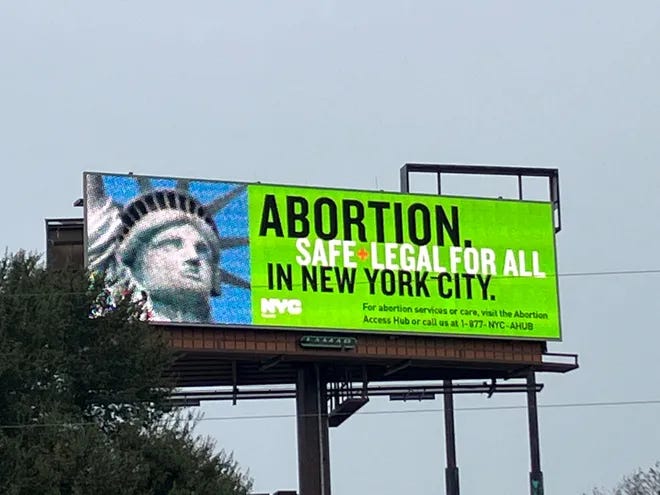In the states…
On Friday, Wyoming’s governor signed a law banning abortion medication—the first state to outlaw the pills specifically. Obviously, any state with an abortion ban outlaws both surgical abortion and abortion medication—but this law pointedly targets the pills, making it illegal to “prescribe, dispense, distribute, sell or use any drug for the purpose of procuring or performing an abortion on any person.”
Three things are especially notable about the legislation:
It uses the phrase ‘chemical abortion’, which is not a medical or scientific term—but language created by anti-abortion activists and organizations (which means they had a hand in drafting the legislation).
The law allows abortion medication to be used to treat “natural miscarriages”—which, like the term ‘accidental miscarriage’ used in an Arkansas bill, insinuates that there is such a thing as an ‘unnatural miscarriage’. It’s a distinction that could be used to target women that the state claims caused their miscarriages.
Abortion medication is allowed to be used if it’s necessary to save women’s health or lives from “imminent peril”—language that continues to put doctors in the position of having to decide just how close to death a woman needs to be in order to give her care.
Wyoming Gov. Mark Gordon also allowed a second piece of legislation to become law without his signature—the Life is a Human Right Act, which bans abortion and makes it punishable by five years in prison. A similar ban was blocked by courts, as Wyoming’s constitution includes a right to make your own health care decisions. This more recent ban is an attempt to try again, stating explicitly that “abortion as defined in this act is not health care.” I’ll keep you updated as I find out more.
In South Carolina, nine legislators who signed onto a bill that would make abortion punishable by the death penalty are pulling their support in light of public outrage. Hilariously, the lawmakers are claiming they didn’t quite realize what they were signing onto. Rep. Brandon Guffey, for example, said, “I read through it, but I did not click on the code that it linked to stating that a woman should get the death penalty.” (By the way, I think the community here can pat itself on the back for this: Abortion, Every Day broke this news, and you all as readers and listeners raised the alarm and made it a national story.)
Things continue to be dire in Tennessee, where the state’s total abortion ban requires doctors to break the law in order to provide life-saving abortions. As has been in the case in other anti-choice states, doctors—OBGYNs, especially—are increasingly leaving Tennessee because of their inability to provide adequate care to patients. (And the fear, of course, of going to prison for doing so.) One OBGYN who practiced in the state for 20 years described being told by anti-abortion activist that a pregnant woman with breast cancer shouldn’t be able to get treatment because “the mom is probably going to die from breast cancer, so we need to protect the baby.”
This kind of thinking is common in Tennessee anti-abortion circles. The Guardian has a shocking piece, for example, about a recent speech given by Will Brewer of Tennessee Right to Life (the group that has been lobbying against the inclusion of an exception for women’s health and lives):
“Speaking last week before the West Knoxville Republican Club, Brewer also questioned the veracity of medical diagnoses involving what is known as lethal fetal anomalies.
‘Who’s to say with any kind of certainty what a medically futile pregnancy is or a fatal fetal anomaly, which is some condition with the baby that will not allow it to live outside of the womb?’ he said.”
The Guardian also got ahold of a memo by an anti-abortion activist in the state objecting to any language that would allow abortions to prevent injury to women’s health and lives. “A physician could perform an abortion to ‘prevent’ a condition that might not ever materialize,” he wrote. Don’t ever let them tell you they care about ‘life’.
In the same way doctors are leaving Tennessee, they’re leaving Idaho. (You may remember that a study showed that nearly half of the OBGYNs in the state were either leaving or considering leaving.) As a result, hospitals don’t have enough staff to keep up their labor and delivery wards: This week, Bonner General Health hospital in Bonner County, Idaho, was the latest to shut down their department. A press release from the hospital announcing the closure pointed directly to political attacks on doctors:
“The Idaho Legislature continues to introduce and pass bills that criminalize physicians for medical care nationally recognized as the standard of care. Consequences for Idaho physicians providing the standard of care may include civil litigation and criminal prosecution, leading to jail time or fines.”
The release also noted how doctors are leaving the state, and that recruiting replacements is “extraordinarily difficult.” Pregnant women in the county will now need to drive an hour to get care.
We continue to see horror stories coming out of anti-abortion states; the latest comes out of Texas, where a woman is being forced to carry a doomed pregnancy to term:
Experts spoke to Newsweek about the seven states they believe are about to have a terrifying jump in maternal mortality rates: Arkansas, Idaho, Mississippi, Missouri, South Dakota, Texas and Wisconsin all have abortion bans, but haven’t expanded their postpartum Medicaid coverage past 60 days. (Mississippi’s governor is expected to sign an expansion soon.) We already know that states with abortion restrictions and bans have higher maternal mortality rates—with the numbers going up with each new restriction. Expanding postpartum Medicaid coverage has become part of some Republicans’ new “post-Dobbs guilt bills”—though many states are dragging their feet.
New York is buying billboards in anti-abortion states like Georgia to let people know that they can travel there for abortion care:
But local activists have mixed feelings about the campaign. Roula AbiSamra with Amplify Georgia says, “I'm glad that information exists, and it also kind of feels like a punch in the gut.” And Jasmine Keith with the New Georgia Project, says, “People who are just like working to make ends meet as it is, and young people are going to not really be served by a billboard that says, 'You can come to New York City.’”
Quick hits:
POLITICO looks at the ballot measure fight ahead in Ohio, while activists in the state train on how to collect the signatures needed to move the measure forward;
New Mexico Gov. Michelle Lujan Grisham is expected to sign legislation that protects abortion providers and patients from out-of-state lawsuits and criminalization;
Minnesota lawmakers are considering a similar bill to protect providers and patients;
A Nebraska Republican introduced an amendment to a proposed abortion ban that would expand the time someone can get care from 6 weeks to 12 weeks—a move that pissed off both sides;
On Friday, the Vermont Senate passed protections for abortion providers;
And Arkansas is moving ahead with their weirdo monument to the unborn at the state Capitol.
In the nation…
A transcript of last week’s hearing in the abortion medication lawsuit has been released, and in the least surprising news ever—Judge Matthew Kacsmaryk used anti-abortion rhetoric, calling abortion providers ‘abortionists’. Naturally.
If you’re a regular reader, you know that we’ve been paying close attention to Republicans’ strategy of attacking ballot measures and voters’ ability to make their voices heard on abortion rights. Legislators in multiple states are either trying to make it harder to pass ballot measures, or ban voters from using ballot measures on abortion laws at all. This weekend, POLITICO looked at the trend and how lawmakers and anti-abortion organizations are going all-in—especially after seeing how voters in places like Kentucky and Kansas came out to support abortion rights.
Kelsey Pritchard of Susan B. Anthony Pro-Life America called it a “wake-up call,” and told POLITICO they plan to spend tens of millions of dollars to fight abortion-related ballot measures over the next two years. “We’re going to be really engaged,” she said.
If you want to know just how scared they are of ballot measures, consider that in Oklahoma, one of the state’s major anti-abortion groups is pushing Republican legislators to add exceptions for rape and incest to the state’s ban; they’re afraid that not doing so will make it easier for a future pro-choice ballot measure to pass. Tony Lauinger of Oklahomans for Life wrote to lawmakers, “The abortion industry has the weapon to defeat what we regard as the ideal policy. The initiative petition is their trump card.” They know voters—even in Oklahoma—don’t want abortion to be illegal.
Salon has an oped from Yasmin Cader of the Trone Center for Justice and Equality for the ACLU, who writes that the criminalization of abortion should have us thinking about the carceral system as a whole:
“The widening net of criminalization after Roe should alarm all of us. But our work is not simply to push back to life before Dobbs. We can take this moment to shine a light on how systems of oppression work in tandem to uphold the system that abortion criminalization will handily funnel more people into. And the people already long ensnared in that system must be part of the conversation, and our advocacy. This is a time to challenge the limits of our empathy — and create a broader, stronger coalition for justice.”
Law professor David Cohen (who you should definitely be following) has an interesting Twitter thread explaining what he thinks is a fatal flaw in the case against abortion medication:

And over at Vox, reporter Rachel Cohen raises the alarm about a disturbing effort from our least favorite Texas lawyer, Jonathan Mitchell—who you know as the architect of the state’s bounty hunter mandate, and the asshole who is representing the man suing three women for allegedly helping his ex-wife get an abortion. Mitchell, it seems, has a new project in mind: Changing the way that injunctions work so that anyone who provides an abortion while an abortion ban is blocked would still be legally liable for ending those pregnancies. Make sure to read the whole thing; it’s very much in line with what we talk about a lot here: Conservatives weakening the power of democracy and the courts to ban abortion.
Quick hits:
The Texas Tribune has a good piece on the Comstock Act and how it relates to the battle over abortion medication;
Donald Trump continues to remain mum on abortion rights, even as anti-choice groups make clear they expect a radical position from any Republican presidential candidate;
And Rewire has two good pieces you should check out: One looking at how college campuses are putting in vending machines with emergency contraception, and another about the ‘wellness’ influencers launching a cultural misinformation campaign against hormonal contraception.
By clicking the ❤️ button, you help more people discover Abortion, Every Day on Substack
Listen to this episode with a 7-day free trial
Subscribe to Abortion, Every Day to listen to this post and get 7 days of free access to the full post archives.
















